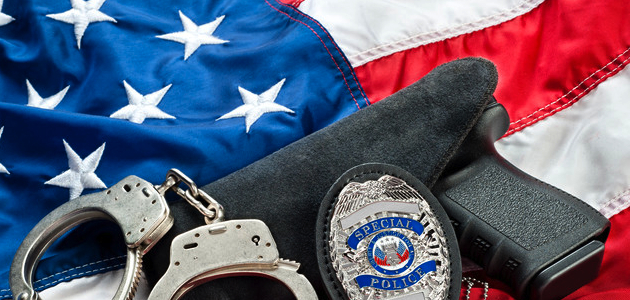Racial Profiling in Paradise
by Martha K. Huggins, Ph.D….

What Traffic Tickets and “Disorderly Conduct” Reveal…
What would you think if you were stopped by Key West police, on average, three times a year over 5 years—5 times in 2011 alone? To your credit, you had no stops for DWI. Your traffic infractions were for such things as not wearing your seat belt—a violation discovered after you’d been stopped for loud music; how about ‘failure to stop’ and ‘to yield,’ ‘driving at an ‘unlawful speed,’ and going the wrong way on a one-way street. Then cops got you for failure to update your driver’s license address, not having the car’s registration in your vehicle, and for your vehicle’s being in an ‘unsafe condition.’ You were even stopped, handcuffed, and questioned once while walking your dog! On top of all this, you were charged with a petty theft that you may not have committed. All of these things happened to African American KeyWester Everette Fitzgerald Wilson between 2009 and 2013.
Would you hire a lawyer to challenge what seemed like police harassment? Everette Wilson, born in 1964, could not afford an attorney, so he handled his traffic citations and misdemeanor charges himself, usually with great success but not without personal consequences. Mr. Wilson got six of his nine traffic citations, probably considered frivolous by the court, dismissed. He paid the fine for two more traffic citations–for unlawful speed and for driving an unsafe vehicle. The remaining traffic violation–his failure to stop at a sign or traffic signal–was listed as, “adjudicated,” whatever that means. Everette Wilson took two of his profiling complaints against Key West police to the Civilian Review Board (CRB). I bet questioning police actions and seeking redress through the CRB for what Mr. Wilson perceived as police violations of his civil rights, got him into trouble with Key West police. As Attorney John Whitehead has recently argued, “If you don’t want to get probed, poked, pinched, tasered, tackled, searched, seized, stripped, manhandled, arrested, shot, or killed, [then] don’t say, do or even suggest anything that even hints of noncompliance [with police]”[i]
But Everette Wilson’s actions were not in vain: His case teaches a great deal about racial profiling and the ways this can be covered up, whether intentionally or not, by normal justice system patterns and practices. I have used the word “racial profiling” many times over the years, but I must admit that I had never really seen what racial targeting might look like on a person’s official ‘rap sheet.’ I have also discovered that official ‘rap sheets,’ by indicating only a case’s end result—guilty/not guilty, and very briefly, for what—can disguise possibly discriminatory patterns and practices of law enforcement. Such practices often get folded into a plea bargain, as happened frequently to Everette Wilson. In the US, “Ninety-seven percent of federal convictions and ninety-four percent of state convictions are the result of guilty pleas” by a defendant (emphasis in original): “Taking a criminal case to trial is the exception and not the rule [, even though] between two and eight percent of convicted felons [have been found] innocent…after taking plea deals.”[ii]
A ‘Rap Sheet’ Shows Only a Small Portion of the Story
Everette Wilson’s record at Key West’s Monroe County Court House, for February 18, 2012, indicates “disorderly conduct” as the violation for which he was found guilty. In fact, Wilson’s exchange with KWPD police officer Brian Leahy that day involved much more than “disorderly conduct.”
Everette Wilson was noteworthy for being Black:
- Talking into car window while Black: Officer Leahy said that Wilson had his arms inside and was leaning into the driver’s side window of a Chevrolet that was stopped in the middle of Petronia Street—Conclusion: Wilson must be involved in a drug deal.
- Being Black with ‘too much’ cash in pocket.” Wilson had $830 on him, further evidence that this “Perp” was a drug dealer. Conclusion: since this amount of money is “consistent with street-level drug sales,” Wilson must have been selling drugs.
- Living where Black drug dealing is done. Officer Leahy was on high alert because the alleged drug deal was in an area where he had investigated “numerous narcotic-related incidents.” Conclusion: A city’s real or imagined geography—“poor”/ “rich” areas, usually distinguished from one another by their racial concentrations—suggests the kinds of people who “ought” and “ought not” be in each area. If you’re Black and in the “wrong” place then you’re obviously up to no good. Apparently drug customers are not out of place in either white or Black city geographies.
But Everette Wilson was actually arrested on February 18, 2012, on an outstanding warrant for a prior failure to appear in court on a charge of stealing two TVs on April 26, 2011, from the Truman Avenue CVS. (Timothy Jacobsen, a White man, wouold later steal a TV and a Stereo (on December 4, 2011) from a Roosevelt Boulevard “department store.”[iii] Jacobsen’s loot valued at $837—was very close to the cash ($830) confiscated from Everette Wilson during his February 18, 2012, arrest). One might suspect that Wilson may be innocent of stealing the TVs and was mistakenly arrested on Jacobsen’s warrant. Someone may be able to prove this speculation right or wrong.
In any case, Everette Wilson sent his charges against Officer Leahy to the Key West Citizens’ Review Board alleging that Officer Leahy had violated his civil rights during the February 18, 2012, arrest.
Everette Fitzgerald Wilson, 48, claims Officer Brian Leahy abused his authority by firing a Taser at Wilson’s back while chasing him on Petronia Street on Feb. 18, [2012]. Wilson alleged that Officer Leahy had demonstrated racial profiling, abuse of authority, and improper use of a Taser that day.
Because Leahy exited his patrol car with Taser in hand, when Wilson alleges he was not acting in a threatening manner, the officer intended to tase Wilson. Officer Leahy concurred that he had exited his patrol vehicle with Taser drawn and approached Wilson from behind. When Wilson turned and saw Leahy, Wilson ran toward the stairs of a nearby apartment at 733 Whitehead Street. Leahy shot the Taser as Wilson ran–one prong hitting Wilson, the other hitting a wall.
According to the KW Citizen,[iv] Wilson barricaded himself inside the second-floor apartment for a while before exiting the apartment and being arrested. Leahy found the $830 in Wilson’s hand; Wilson claimed the cash was for paying a long over-due sewer bill. As I remember, the CRB was never able to verify with the proper utility authority that this money was due.
I discovered that sometime in 2014, that less than half of the $830 confiscated by police from Everette Wilson had been returned to Wilson’s wife. She had apparently successfully convinced officials that it was hers and not the product of a drug deal. But the larger portion of the Wilson family’s money was kept by the KWPD—a civil forfeiture against a prior “judgment lien.” Since 2001, more than $2.5 billion has been taken just from motorists who were never charged with a crime.[v] “Police stop a motorist for a minor traffic violation, then they ask to search the vehicle. If there is cash or valuable property in the car, police then ask the driver to prove that it was not obtained during the commission of a crime. If the driver is not able to prove where the money or property came from, it’s seized by police,” which is what happened in the case of Everette Wilson’s $830, even though not related to a moving violation.
Bad Grades for Police Chief Lee and the CRB
Raw numbers hide Racism: Statistics 101. To determine the relative impact of particular policies or practices on different racial and ethnic groups’ getting traffic citations, being tasered, or arrested, one must convert raw numbers into proportions or rates.
- Traffic citations. In an Everette Wilson case heard by the CRB, Mr. Wilson charged Key West Officer Curtis Richardson with profiling Blacks in his traffic ticketing. Chief Lee’s statistics showed that Curtis Richardson had issued 31 tickets to Whites and only 14 to Blacks during his time on the force. This, Chief Lee assured the CRB, demonstrated that Officer Richardson had not profiled Blacks. Incorrect conclusion from these statistics: Officer Richardson issued traffic tickets to Blacks at a proportion three-times this group’s share of Key West’s population; Whites were ticketed at exactly their proportion of the city’s population. But the CRB deemed Everette Wilson’s charges against policeman Curtis Richardson, “unfounded.”
- Milwaukee, Wisconsin, traffic stops: “A Black Milwaukee driver is 7 times as likely to be stopped by city police as a white resident driver.”[vi]
- Cincinatti, Ohio, traffic stops: Blacks “had longer stops and higher search rates than white drivers.”[vii]
- Tasering: In Everette Wilson’s request for CRB review of his case charging KWPD officer Leahy with racial profiling in use of his taser, Chief Lee offered the CRB no data on Officer Leahy’s taser use, even though such data were easily available to the police chief. Key West’s police department taser records (including both threats of taser use and its actual use—including few cases where chemical spray was instead employed)–obtained by The Blue Paper through a public records request, demonstrate that:
- In 2011, KWPD police threatened or used a taser against Blacks, 2 ½ times their proportion of Key West’s population.
- In 2012 (the year that Everette Wilson was tased by Officer Leahy), Blacks were again threatened with a taser, or tased, 2 ½ times their share of Key West’s population–not four times their share, as I stated previously.
- In 2013, taser use or its threatened deployment against Blacks declined slightly to 2 times Black’s share of Key West’s population—not to 1 ½ times as stated previously.
- As for whites being threatened with a taser, or tased, this occurred in proportions under white’s share of Key West’s population in 2011 and 2012, while in 2013, whites were threatened with tasing or tased at slightly over their share of Key West’s population.
- Houston, Texas, Tasering:–a city that may be inching toward a DOJ investigation of police force patterns and practices—tases whites at a proportion three times less than their share of Houston’s population, while Blacks are tased at around 2 ¾ times greater than their proportion of Houston’s population. [viii]
- Arrests. In response to Everette Wilson’s complaint to the CRB that Officer Brian Leahy had practiced racial profiling in arresting him, KWPD Chief Donnie Lee provided the CRB with the raw numbers of Leahy’s arrests by race: Leahy had made 39 arrests of whites and only of 11 of blacks since Leahy was hired. The data clearly do not support such the Chief’s conclusion that Officer Leahy did not profile Blacks for arrest: out of the 50 arrests since Officer Leahy joined the KWPD, 22% were of Blacks—more than two times their share of Key West’s population; whites’ arrests were 78%—a proportion only slightly above their share of the city’s population. Nevertheless, the CRB deemed Everette Wilson’s case against officer Leahy, to be “unfounded.”
- Black arrests, US. Even though the same percentage of whites, Blacks, and Hispanics were stopped in the US by law enforcement (9% for each group), Blacks were 3 times more likely than whites to be searched and handcuffed, and almost three times more likely to be arrested.
Some policing in Key West’s Paradise is clearly worse than other cities’; most is roughly equal to other US cities, although that is hardly anything to be proud of. Several forms of racial profiling are alive and well in Paradise a fact to be accepted and corrected before Key West is faced with the Department of Justice using its subpoena powers to dig through police and other Key West government records and require interviews from Key West police officers, city officials, CRB members, and administrative rank-and-file. We can make the necessary changes in policing ourselves if we admit that, right now, justice in our Paradise is not blind.
[editor’s note: this article was updated by the author 4/5/2015 to correct data errors:
From Dr. Huggins:
I wish to apologize to my readers for two errors in the statistics I analyzed on KWPD taser use for 2011-2013). I had used a set of arrest forms that related to “police take-downs” during an arrest, without using a taser. Academics can be wrong, but when we are we quickly admit it and correct our errors.]
[i]https://www.rutherford.org/publications_resources/john_whiteheads_commentary/resistance_is_futile_the_violent_cost_of_challenging_the_american_police_st
[ii] http://theantimedia.org/innocent-people-take-plea-bargains/
[iii] See Key West Citizen Archives, “Stereo, TV not easily concealed,” 12/05/2011
[iv] See Key West Citizen Archives, “Oversight board clears two police officers of charges,” 12/11/2012
[v] http://www.addictinginfo.org/2014/09/15/cops-take-2-5-billion-from-innocent-motorists/
DID YOU LIKE THIS STORY? SUPPORT THE BLUE PAPER
Help us continue to bring you local investigative journalism… Click on the image to make a donation [NOT tax deductible].




suffice it to say key west is now ‘doomed’ after the eimer’s fiasco.
a milita is needed supporting the public safety like the bundy ranch milita protecting their cattle rights.
or you can just hang this baggie out your car window.
http://www.shtfplan.com/emergency-preparedness/dui-checkpoint-say-nothing-and-display-thisyou-do-not-have-to-roll-your-window-down-you-do-not-have-to-talk-to-police_01072015?utm_source=feedburner&utm_medium=feed&utm_campaign=Feed%3A+SHTFplan+%28SHTF+Plan+-+When+It+Hits+The+Fan%2C+Don%27t+Say+We+Didn%27t+Warn+You%29
but above all make sure you have a great lawyer and a 360 degree dash cam to record all the police activity streaming it to the internet and your home hard drive.
btw one last thing in case of a traffic stop while in key west… avoid beaches!
Pleas attend the ACLU PANEL on “Policing in Paradise, I’ll be there April 13 7-9 see this issue of Blue Paper for location and details
“Like” thanks for reading sorry it’s so (too) long!
I will make my follow-ups shorter. Thx for your observations and the extra post. Martha
Great report on the state of Key West’s policing policy. Has the DOJ responded to the KWCRB’s request to investigate the Charles Eimers death at the hands of the KWPD? Thanks to the Blue Paper and investigative journalists like Arnaud and Naja Girard, JD Adler and Professor Huggins or the public would remain ignorant of this illegal and immoral behavior by the very people that are supposed to protect us from criminals and criminal activity…
Thanks Alex, as always working with you for justice Martha
April 13, 7-9 PM, Harvey Government Center, 1200 Truman Avenue, Key West, excellent group to talk about “Policing in Paradise” sponsored by the KW/Keys ACLU. PLEASE GO AND ASK QUESTIONS
See you there.
“Like”
Very good any logical argument that proves racial profiling is being used by KW police. It seems the Key West police can do anything they want and not even get a slap on the wrist when they are wrong. The citizenry needs to get the permits and get all people to have a major march as it is hopeless to get any authorities to act upon these thugs. You need a very large crowd and have many videos recording the event. All need to know that no matter how legal and civilized this march is, the KW police will attack and blame everyone else but themselves for any problems.
Please attend the ACLU Panel on “Policing in Paradise,” I’ll be there April 13 7-9 see this issue of Blue Paper for location and details. Thanks for your important insights. I appreciate them. Martha
The biggest problem is the attorney for the CRB is Big Bubba,
Is it the same one as in 2012. What concerns me is that the membership (I dont remember a dissenting vote) voted Everette Wilson’s charges of profiling to bE “unfounded,” them seem compromised too. Moreover, some very smart CRB members accepted the police chief’s raw, and thus, misleading statistical delivery!!! Thanks for your input. Martha